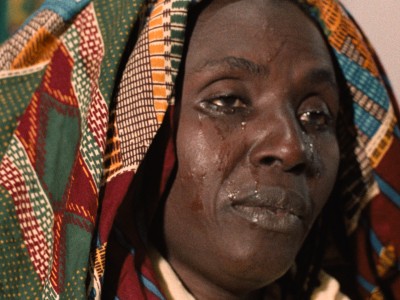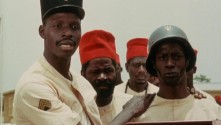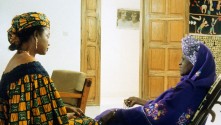
Mandabi
With Makhouredia Gueye, Ynousse N’Diaye, Isseu Niang.
Senegal/France, 1968, DCP, color, 91 min.
Wolof and French with English subtitles.
DCP source: Janus Films
Winner of the Special Jury Prize at the Venice Film Festival, Ousmane Sembène’s Mandabi is an adaptation of his novella The Money Order. Ibrahima Dieng (Makhourédia Guèye) receives a money order from a hard-working nephew in Paris, who requests that he withdraw the funds on his behalf. This seemingly simple task unravels into a mess of bureaucratic red tape worsened by Ibrahima’s illiteracy, lack of identification papers and tendency to lend more than he owns. As Ibrahima is chased by creditors, debtors, scammers and bureaucrats (including one played by Sembène), his strong-willed wives (Ynousse N'Diaye and Isseu Niang) hold down the fort. As a French-Senegalese co-production, Mandabi was required to have two cuts: one in French and one in Wolof, making it the first feature-length film in an African language. Unlike Sembène’s earlier films, which use French dubbing as an extratextual layer of colonial violence, Mandabi’s characters conspicuously switch from Wolof to French when cheating one another. Despite his reticence to film Mandabi in color, Sembène’s palette is stunning and selective, concentrated in striking visual motifs: a white doll, a red bra, a crumpled piece of paper.
Regarding the unusual financing behind the short film Tauw, a commission by the National Council of the Church of Christ, Sembène simply stated: "I am taking the money from where I can get it.” A short film about youth unemployment in Senegal, it is in no way a compromised work. As Sembène would continue to do in films like Faat Kiné, Tauw questions the meaning of national independence in the context of individual independence. Like the child whose bottom is spanked in the film’s opening, the film’s eponymous protagonist Tauw is infantilized by the employment office (where one of the workers is played by Sembène) and by his parents. But it is the latter who push for Tauw to take hold of his future, a responsibility the government refuses to claim. Sembène’s depiction of youth unemployment as a series of starts and stops between panic and leisure (expressed with sharp cuts and tracking shots) recalls his own young adulthood in Dakar, where he witnessed widespread postwar unemployment as a member of the construction workers’ union.



















